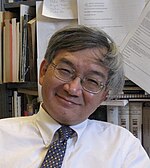Moses H. W. Chan
Moses Hung-Wai Chan | |
|---|---|
 Moses Hung-Wai Chan | |
| Born | November 23, 1946 Xi'an, China |
| Nationality | American |
| Alma mater | Bridgewater College(BSC), Cornell University(Ph.D.) |
| Known for | Research in Low temperature physics, on solid 4He. |
| Awards | Fritz London Memorial Prize(1996) |
| Scientific career | |
| Fields | Condensed matter physics, Low temperature physics |
| Institutions | Penn State University |
| Doctoral advisor | John Reppy |
Moses Hung-Wai Chan (Chinese: 陳鴻渭; pinyin: Chén Hóngwèi) is a Chinese-American physicist who is Evan Pugh Professor at Pennsylvania State University. He is an alumnus of Bridgewater College and Cornell University, where he earned his Ph.D. in 1974 and was a postdoctoral associate at Duke University. He has been a professor at Penn State's University Park Campus since 1979.
Through the years, Chan's work has spanned many diverse topics.[1] For his numerous contributions to low-temperature physics, in 1996 he shared the prestigious Fritz London Memorial prize with Carl Wieman and Eric A. Cornell.[2] He was elected a member of the National Academy of Sciences in 2000, and a fellow of the American Academy of Arts and Sciences in 2004.[3]
Chan is known for the experimental discovery of evidence for a new supersolid quantum state of matter,[4][5] predicted theoretically in 1969 by Alexander Andreev and Ilya Liftshitz, and its subsequent refutation.[6] Other significant discoveries include the experimental observation of Critical Casimir effect[7] and the experimental confirmation of 2D Ising model.[8]
References
[edit]- ^ Complete list of publications. Archived 2006-09-06 at the Wayback Machine
- ^ Fritz London Memorial Prize
- ^ List of active members by class, October 24, 2014
- ^ E. Kim and M. H. W. Chan (2004). "Probable Observation of a Supersolid Helium Phase". Nature. 427 (6971): 225–227. Bibcode:2004Natur.427..225K. doi:10.1038/nature02220. PMID 14724632. S2CID 3112651.
- ^ Nature story on a supersolid experiment
- ^ D. Y. Kim and M. H. W. Chan (2012). "Absence of Supersolidity in Solid Helium in Porous Vycor Glass". Physical Review Letters. 109 (15): 155301. arXiv:1207.7050. Bibcode:2012PhRvL.109o5301K. doi:10.1103/physrevlett.109.155301. PMID 23102323. S2CID 23590787.
- ^ R. Garcia and M. H. W. Chan (1999). "Critical Fluctuation-Induced Thinning of 4He Films near the Superfluid Transition". Physical Review Letters. 83 (6): 1187–1190. Bibcode:1999PhRvL..83.1187G. doi:10.1103/PhysRevLett.83.1187. S2CID 51372560.
- ^ H. K. Kim and M. H. W. Chan (1984). "An Experimental Determination of a Two-Dmensional Liquid-Vapor Critical Point Exponent". Physical Review Letters. 53 (2): 170–173. Bibcode:1984PhRvL..53..170K. doi:10.1103/PhysRevLett.53.170.
External links
[edit]- 1946 births
- Living people
- 20th-century American physicists
- 21st-century American physicists
- Bridgewater College alumni
- Cornell University alumni
- Duke University fellows
- Fellows of the American Academy of Arts and Sciences
- Fellows of the American Physical Society
- Members of the United States National Academy of Sciences
- Pennsylvania State University faculty
- People from Xi'an
- People's Republic of China emigrants to the United States
- Physicists from Shaanxi
- Educators from Shaanxi
